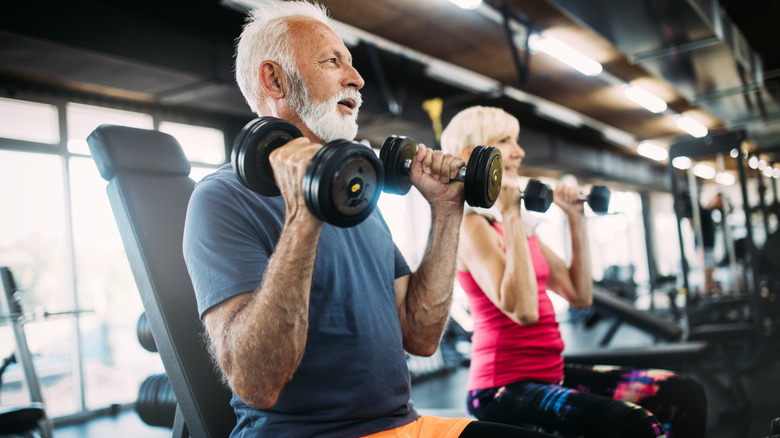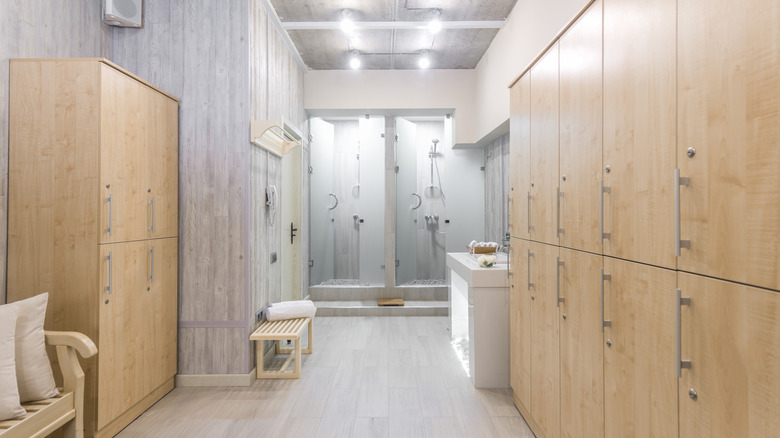How To Practice Good Hygiene At A Public Gym
Whether you've finished leg day or just got done jumping rope, nothing feels better than the post-workout high. While it's tempting to bask in this adrenaline rush by crashing on the sofa, you may want to think twice about your first post-workout ritual since the gym is loaded with germs.
According to WebMD, skin fungal infections — such as athlete's foot, yeast infections, and jock itch — are common for gym-goers. Infections can come from sharing germy gym equipment, hanging out in sweaty clothes, and more. The best way to safeguard against infection is to practice good post-workout hygiene habits.
Before and after your workout, wipe down and disinfect the gym equipment. Once you're done, it's important to thoroughly wash your hands. The Centers for Disease Control and Prevention (CDC) recommends wetting your hands, applying soap, lathering and scrubbing your hands for at least 20 seconds, and then rinsing. If you don't have access to water and soap, the CDC suggests using a hand sanitizer that contains at least 60% alcohol.
Dermatologist Dr. Debra Jaliman points out via Livestrong, "It's important to wash your face before and after you exercise since cleansing your skin before can help minimize the grime and bacteria that enters the pores, and washing up afterwards can remove sweat and any makeup that's been left behind." Don't share towels, water bottles, soaps, razors, or sweaty clothes. Be sure to wear water shoes or flip-flops if you're planning on showering at the gym (per WebMD).
Be conscious of your skin, feet, and personal care products
Relaxing in a hot environment such as a sauna or steam room post-workout is a well-deserved and potentially even healthy treat. For example, research suggests saunas are linked to heart health benefits (via Refinery29). But to make the most out of these health benefits, it's important to practice good hygiene.
In an interview with Livestrong, Dr. Sara Gottfried shares that these hot, dark, and moist environments are a playground for infections because viruses, mold, and bacteria flourish in these types of spaces. To limit your exposure to infections, Dr. Gottfried recommends sanitizing where you plan to sit down and to sit on top of a towel. Moreover, you'll want to avoid whirlpools and any common areas if you have a cut, infection, or open wound, shares WebMD.
Practicing good hygiene at public gyms also means making sure your feet are protected too. Since there are a lot of bacteria found in gyms, it's important to never shower barefoot in a public shower like you would at home. Some of the bacteria and fungi found in gyms locker rooms include E. coli, flu and cold viruses, strep, and staph, points out Dr. Eliza Chakravarty from the Oklahoma Medical Research Foundation (via Livestrong). WebMD suggests showering with flip-flops or water shoes and spending extra time cleansing and drying your feet. Don't share towels, water bottles, razors, or any other personal care products.
How to practice good hygiene once you're home
Now that your hands, face, and sports equipment are thoroughly cleaned, you'll want to hop in the shower as soon as possible, WebMD points out. While you've earned a well-deserved rest post-workout, spending unnecessary time in your sweaty clothes promotes a breeding ground for bacteria. This is especially the case for women, because staying in sweaty underwear can lead to overgrowth of yeast and cause changes in vaginal pH.
"When a woman works out and stays in sweaty clothes longer than necessary, the breathability of the vaginal area is limited due to bottoms that trap in sweat and moisture," notes gynecologist-obstetrician Dr. Sheila Loanzon (per Livestrong). Thus, it's best to shower as soon as you can, but if that option is not available, the next best choice is to change your undies and clothes.
In addition, it's important to wash and dry all your workout clothes (e.g. socks, undergarments, swimsuits) after each use. If you find yourself needing to rewear some clothes, it may not be too much of a health risk, since drying can destroy up to 90% of bacteria (per Self). Keep in mind, though, that if you're susceptible to skin folliculitis, acne, or any other inflammatory skin conditions, tossing on old gym clothes may trigger an infection or outbreak. You should also avoid putting on dirty clothes if you have any breaks in the skin that aren't properly bandaged.



